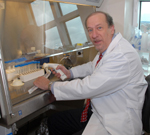|
|

|
Director determined to achieve designation
|
by Mary Helen Yarborough
Public Relations
Less than five years ago when Andrew S. Kraft, M.D., was recruited from
the University of Colorado to direct Hollings Cancer Center (HCC), he
stated his primary mission to make South Carolina’s only academic-based
cancer center among the finest in the country by achieving the status
as a National Cancer Institute (NCI)-designated cancer center.
 Dr. Andrew Kraft in his lab. Dr. Andrew Kraft in his lab.
For most, much larger cancer centers, five years would be at least what
was expected to join the ranks of a national class of cancer centers.
But Kraft and former U.S. Sen. Ernest Hollings wanted it in three
years or less, marveled Anita Harrison, HCC associate director for
administration.
Having helped Washington University in St. Louis to obtain its NCI
designation from 1995-2001, plus serving as an NCI review panelist for
centers seeking designation since 2001, Harrison was a perfect fit for
Kraft’s assignment. With uncommon success in helping other medical
institutions achieve status as cancer research centers, Kraft recruited
Harrison in 2005 to help build the foundation necessary for the HCC
achievement.
“We weren’t competing with other institutions as much as we were
setting our own high scientific bar to obtain,” Harrison said. “We are
currently one of the smaller institutions among the prestigious group
of NCI designated centers, but the quality of our science and the
synergy we were able to demonstrate over the past few years marked us
distinctly from other institutions vying for this NCI designation.”
The task included a requirement to meet six essential characteristics
the NCI sets for its designated cancer centers. These characteristics
are: institutional commitment, research facilities, organizational
capabilities, quality of leadership, achievement in interdisciplinary
scientific coordination and collaboration, and cancer focus (meaning
many different types of scientists are focused on cancer research). “We
nailed each of these—four with the highest score of ‘outstanding’ and
two with an ‘excellent to outstanding’ rating,” Harrison said.
Much of HCC’s success has been due to faculty recruitment during the
past five years. HCC has fully utilized the opportunity availed through
the state’s Centers of Economic Excellence (CoEE) program, which is how
Kraft accessed critical dollars to lure the best researchers to South
Carolina. “That’s how we recruited Kenneth Tew, Charles Smith, Melanie
Thomas and John Lemasters,” Harrison explained. MUSC/HCC holds six
cancer-related CoEEs which are funded with matching state lottery
money. “We are now actively recruiting with CoEE funding for
nationally recognized experts in tobacco-related malignancies, cancer
stem cell biology and therapy and cancer disparities,” said Harrison.
In retrospect, appointing all the right people to the right positions
at the right time was critical to the designation at MUSC, said
Harrison. Since he came, Kraft has assisted in the recruitment of 29
faculty members. College of Medicine Dean Jerry Reves, M.D., has also
appointed essential cancer-focused clinicians and scientists to
important College of Medicine leadership roles including the recent
appointment of David Cole, M.D., a cancer surgeon and an NCI-funded
translational scientist, to chair the Department of
Surgery.
“The center has scientific membership that now spans virtually all of
the colleges demonstrating that the MUSC leadership has made cancer
research a top priority,” said Harrison.
Timeline of events
- May 25, 2008 was the day that an 800-page-plus written application was submitted to the NCI for review.
- Sept.
25, 2008, was show time; the day that three years of incredible focus
culminated for the NCI reviewers’ site visit. Their arrival occurred
slightly more than four years after Kraft arrived at MUSC. “Many other
programs expect to submit two to three applications before receiving
NCI designation; and we did it with one that is a testament to how hard
everyone worked during the past few years.”
- On
Feb. 20, rumors that HCC had succeeded were made official. “We knew we
had a good score,” Harrison said. “But we also knew that we were in the
midst of unprecedented financial times.”
Not
to rest on his laurels, Kraft said immediately upon learning of the
designation that he wants HCC now to attain comprehensive status with
the National Cancer Institute. Currently, only 39 of the 64 NCI cancer
centers are Comprehensive Cancer Centers. “During the next five years,
HCC leadership will be working toward this new benchmark which will
involve building a robust cancer prevention and control research
program and strengthening the translational aspects of our current
scientific efforts, ” Harrison said.
Meanwhile, the NCI cancer center designation must be maintained and a
renewal application must be made every five years. Kraft not only
expects HCC to hold onto to its newly acquired designation, but he
expects to exceed this designation with comprehensive status in the
next five years, Harrison said.
“This is the first time for him getting an NCI designation as a center
director,” Harrison said. “It’s a crown jewel for him, and he’s not
resting.”
Kraft speaks on others, South Carolina
 Anita Harrison Anita Harrison
“She is an amazing administrator who has made getting the NCI possible
because of her administrative talents and prior experiences. She is
easy to work with, and she is a good listener. She acts on task and
always performs in an outstanding fashion. She hits all deadlines
working long days, weekends and nights.”
Leadership
“Dr. Jerry Reves’s leadership and foresight have been essential
elements in this process. In fact, Drs. Reves, Raymond and Greenberg
have been pivotal in our getting the NCI. It takes the support of
leadership at the highest levels of an institution like it does in any
organization. Drs. Reves and Raymond made certain we had the resources
and commitment necessary to succeed; and Dr. Reves was successful in
pulling those resources together. We are fortunate to have had the
support and leadership of Drs. Reves and Raymond who helped make
getting the NCI designation possible. Dr. Greenberg has stood behind
them all of the way.”
What does this mean for South Carolina?
Across South Carolina, HCC has nine sites that serve as satellites for
clinical trials and two strong affiliates that are clear partners with
the center. HCC intends to utilize these partnerships to translate its
latest research findings into the standards of care to reduce cancer
mortality, morbidity and disparities across the state. Interestingly,
HCC is the only NCI cancer center located between Durham, N.C., and
Tampa, Fla.
“Hollings Cancer Center has 100 scientific members and a staff that
includes volunteers, administrative and medical staff; and we have
three community boards. The patients take part in clinical
trials, increasing our ability to carry out our clinical and basic
studies that will improve cancer outcomes.
“Clinical research doesn’t make you a better practitioner than the guy
down the street, but it allows you to add to therapies and give
patients added hope. NCI designation will allow us to be able to
recruit the best scientists and doctors to South Carolina. Designation
will provide more funding that will help create additional jobs, and
develop novel treatments to cure cancer.”
Friday, March 6, 2009
|
|
|




 Anita Harrison
Anita Harrison